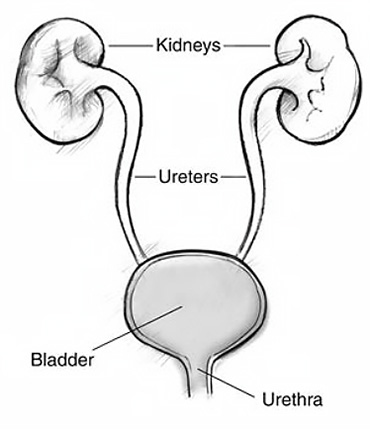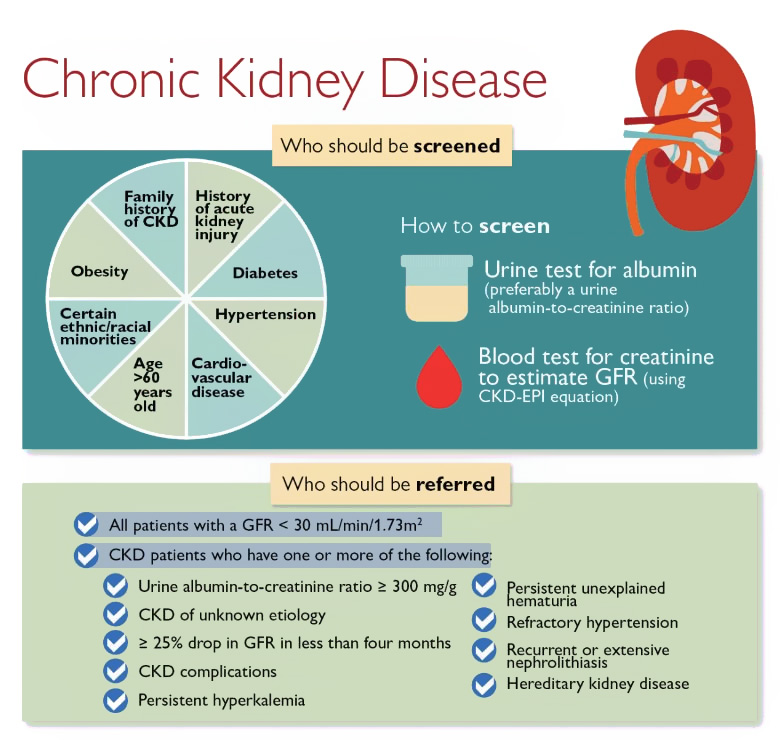Patient Education
The need for more research
The prevalence of kidney disease has continued to rise steadily and the lack of research and new discoveries has hindered the delivery of optimal medical care and treatments to affected individuals. For the Iran s kidney community, it became evident that there simply wasn’t enough innovative research on kidney disease being done. A cohesive, focused research endeavor to bring the best science to the study of the most important clinical problems needed to be in place to truly make a difference in the lives of people with kidney disease.
ABOUT CHRONIC KIDNEY DISEASE
FOR PATIENTS EDUCATION


Stages of Kidney Disease
There are five stages of kidney disease. They are shown in the table below. Your healthcare provider determines your stage of kidney disease based on the presence of kidney damage and your glomerular filtration rate (GFR), which is a measure of your kidney function. Your treatment is based on your stage of kidney disease. Speak to your healthcare provider if you have any questions about your stage of kidney disease or your treatment.
What are kidneys and why are they important?
You have two kidneys. Each kidney is about the size of your fist. They are located near the middle of your back, just below the rib cage. Healthy kidneys do many important jobs. They:
- Remove waste products and extra water from your body
- Help control blood pressure
- Help make red blood cells
- Help keep bones healthy
Think of your kidneys as a coffee filter. When you make coffee, the filter keeps the coffee grains inside, but allows water to pass through. Your kidneys do something similar. They keep the things you need inside your body, but filter out things you don’t need.
Each of your kidneys has about 1.5 million filters called nephrons. Nephrons remove wastes and extra fluid from your blood in the form of urine. The urine flows through two tubes, called ureters, to the bladder. The urine is stored there until you go to the bathroom.
The wastes come from the breakdown of what you eat or drink, medicine you take, plus normal muscle activity.

What is chronic kidney disease?
Chronic kidney disease means the kidneys are damaged. Damaged kidneys are not able to keep you healthy. They cannot filter your blood well enough, and they cannot do their other jobs as well as they should.
Kidney disease does not happen overnight. It happens slowly, and in stages. Most people in the early stages do not have any symptoms. They may not know that anything is wrong. But if it is found and treated, kidney disease can often be slowed or stopped.
If kidney disease gets worse, wastes can build to high levels in your blood and make you feel sick. You may get other problems like high blood pressure, a low red blood cell count (anemia), weak bones, poor nutrition, and nerve damage.
You will also have a higher chance of getting heart and blood vessel disease.
If it keeps getting worse, it can lead to kidney failure. This means your kidneys no longer work well enough to keep you alive, and you need a treatment like dialysis or a kidney transplant.
What causes kidney disease?
The two most common causes of kidney disease are:
- Diabetes happens when your blood sugar is too high. This causes damage to many organs and muscles in your body, including the kidneys, heart and blood vessels, nerves, and eyes.
- High blood pressure happens when the pressure of your blood against the walls of your blood vessels is too high. If high blood pressure is not controlled, it can cause chronic kidney disease, heart attacks, and strokes.
Many other conditions can harm the kidneys. These include:
- Glomerulonephritis, a group of diseases that hurt the kidneys’ filtering units.
- Inherited diseases, like polycystic kidney disease, which causes cysts to form in the kidneys.
- Lupus and other diseases that affect the body’s immune system.
- Obstructions caused by problems like abnormally shaped ureters, kidney stones, tumors, or an enlarged prostate gland in men.
- Repeated urinary tract infections.
Can anyone get kidney disease?
Yes. Anyone can get kidney disease at any age. But some people are more likely than others to get it. You may have a higher risk for kidney disease if you:
- Have diabetes
- Have high blood pressure
- Have a family member with kidney failure
- Are 60 years or older
- Have used medicines over the course of many years that damage the kidneys
Risk factors increase your chance of getting kidney disease. The more risk factors you have, the greater the risk.

What should I do if I am at higher risk for kidney disease?
Get tested for it. Most people with early kidney disease do not have symptoms. That’s why it’s important to be tested. There are two simple tests to check for kidney disease:
- Urine test
Your urine will be tested for protein. Your body needs protein. But it should be in the blood, not the urine. Having a small amount of protein in your urine may mean that your kidneys are not filtering your blood well enough. This can be a sign of early kidney disease. Having protein in your urine is called “albuminuria.”
- Blood test
Your blood will be tested for a waste product called creatinine. Creatinine comes from muscle tissue. When the kidneys are damaged, they have trouble removing creatinine from your blood.
But testing for creatinine is only the first step. Next, your creatinine result is used in a math formula with your age, race, and sex to find out your glomerular filtration rate (GFR). Your GFR number tells your healthcare provider how well your kidneys
are working.
You should also get your blood pressure checked regularly. Having high blood pressure puts you at risk for kidney disease. Regular checkups help your healthcare provider find and treat high blood pressure. This helps lessen your risk for kidney damage.
Does kidney disease have symptoms?
Most people with early kidney disease do not have symptoms. That’s why it’s important to be tested. In the later stages of kidney disease, you may:
- Feel tired or short of breath
- Have trouble thinking clearly
- Not feel like eating
- Have trouble sleeping
- Have dry, itchy skin
- Have muscle cramping at night
- Need to go to the bathroom more often, especially at night
- Have swollen feet and ankles
- Have puffiness around your eyes, especially in the morning
Can I prevent kidney disease, even if I am at higher risk?
Yes. Not everyone who is at risk will get kidney disease. Talk to your healthcare provider about how to lessen your chances of getting kidney disease. You should also:
- Have regular checkups by your healthcare provider
- Control your blood sugar if you have diabetes
- Control your blood pressure if you have high blood pressure
- Make healthy food choices
- Exercise regularly
- Lose weight if you are overweight
- Stop smoking if you are a smoker
- Limit how much alcohol you drink
- Use only the medicines, vitamins and supplements that your healthcare provider recommends. Some can harm the kidneys.
- Avoid herbal supplements and those used for body building
What if my test results show I already have kidney disease?
More tests might be done to help understand what caused your kidney disease. This can help in planning your treatment. You may also be asked to see a specialist. Examples of tests that might be done are:
- An ultrasound or CT scan to get a picture of your kidneys and urinary system. These pictures show the size of your kidneys, and whether they are too large or too small. They also show whether you have any tumors, kidney stones, or cysts.
- A biopsy to remove a tiny piece of kidney tissue for evaluation. The sample is studied under a microscope to:
See what kind of kidney damage is happening See how much damage has happened Plan treatment
If I have kidney disease, what will my treatment be?
Your treatment plan will depend on your stage of kidney disease and other health problems you may have. It may include:
- Treatment for high blood pressure
High blood pressure can make your kidney disease worse. You may need to take medicine to help control it. You may also need to eat less salt, lose weight if you are overweight, and follow a regular exercise program.
- Protecting kidney function by taking ACE inhibitors or ARBs
You may be asked to take high blood pressure medicines (called ACE inhibitors or ARBs), even if your blood pressure is normal. Research suggests that these medicines can slow the loss of kidney function in some people—even in people with normal blood pressure.
- Controlling blood sugar if you have diabetes
The best way to prevent or slow kidney damage is to keep your blood sugar well controlled. This is usually done with diet, exercise, and, if needed, insulin or pills (called hypoglycemic drugs).
- Controlling high cholesterol with diet and medication
Many people with kidney disease have high cholesterol levels in their blood. High blood cholesterol increases your risk for heart disease. Your healthcare provider will check your cholesterol at least once a year. If it is too high, you may need drugs and exercise to help lower it.
- Treatment for anemia
People with kidney disease often get anemia (low red blood cell count). Why does this happen? Healthy kidneys help your body make red blood cells. If you have kidney disease, your kidneys may not be able to do this very well and you may get anemia. Medicines called ESAs (erythropoiesis-stimulating agents) and iron supplements are used to treat anemia.
- Treatment for mineral and bone disorder
Many people with kidney disease have mineral and bone disorder. Mineral and bone disorder can make your arteries stiffen and become narrow from the extra calcium and phosphorus in your blood. This slows blood flow to your heart and can lead to heart attack and death. You may need special medicines to help treat mineral and bone disorder. You may also need to eat fewer foods
that contain phosphorus, such as dairy, nuts, seeds, dried beans and peas.
- Following an exercise program approved by your healthcare provider
- Controlling your weight with diet and exercise
- Tracking how well you do
Your GFR will be checked regularly to find out if your kidney disease is getting worse.
The amount of protein in your urine will be checked regularly.
Nutritional tests will be done to make sure you are getting enough protein and calories. You may be asked to follow a diet that is lower in protein. If so, you may need extra calories from other foods. A dietitian with special training in kidney disease can help you plan your meals to get the right foods in the right amounts.
If I have kidney disease, can I keep it from getting worse?
Most likely. Treatment can help slow or even stop kidney disease from getting worse. How well your treatment works will depend on:
- Your stage of kidney disease when you start treatment. The earlier you start, the better off you are.
- How carefully you follow your treatment plan. Learn all you can about kidney disease and treatment for it. Make sure to follow all the steps of your treatment.
- The cause of your kidney disease. Some kidney diseases are more difficult to control.
Key Points
- Healthy kidneys do many important jobs. They remove waste products and extra water from your body, help your body make red blood cells, help control blood pressure, and keep your bones healthy.
- When you have kidney disease, your kidneys slowly lose the ability to do the important jobs that keep you healthy. The leading causes of kidney disease are diabetes and high blood pressure.
- If you have risk factors for kidney disease, get tested for it.
- There are two simple tests for kidney disease—a urine test to check for protein in your urine and a blood test to estimate your GFR. Your GFR number helps your healthcare provider know how much kidney function you have. Having protein in your urine for several weeks is an early sign of kidney disease.
- If you have kidney disease, you will need to follow a treatment plan that may include taking medicines, restricting salt, limiting certain foods, getting exercise, and more. Your treatment plan will depend on your stage of kidney disease and any other health problems you may have.
- Finding and treating kidney disease early can help slow or even stop kidney disease from getting worse.
- If you have kidney disease, learn all you can about it. You are an important member of your healthcare team. How carefully you follow your treatment plan may affect how well you do.
- Know your numbers. Ask your healthcare provider about important tests like your GFR and the amount of protein in your urine. Keep track of them.
- If kidney disease gets worse, it can lead to kidney failure. Once kidneys fail, treatment with dialysis or a kidney transplant is needed to stay alive.


